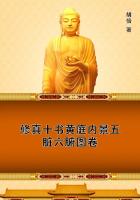Little hope there is in all this. Alas, with whom to fly? Our loyal Gardes-du-Corps, ever since the Insurrection of Women, are disbanded; gone to their homes; gone, many of them, across the Rhine towards Coblentz and Exiled Princes: brave Miomandre and brave Tardivet, these faithful Two, have received, in nocturnal interview with both Majesties, their viaticum of gold louis, of heartfelt thanks from a Queen's lips, though unluckily 'his Majesty stood, back to fire, not speaking;' (Campan, ii. 109-11.) and do now dine through the Provinces; recounting hairsbreadth escapes, insurrectionary horrors. Great horrors; to be swallowed yet of greater.
But on the whole what a falling off from the old splendour of Versailles!
Here in this poor Tuileries, a National Brewer-Colonel, sonorous Santerre, parades officially behind her Majesty's chair. Our high dignitaries, all fled over the Rhine: nothing now to be gained at Court; but hopes, for which life itself must be risked! Obscure busy men frequent the back stairs; with hearsays, wind projects, un fruitful fanfaronades. Young Royalists, at the Theatre de Vaudeville, 'sing couplets;' if that could do any thing. Royalists enough, Captains on furlough, burnt-out Seigneurs, may likewise be met with, 'in the Cafe de Valois, and at Meot the Restaurateur's.' There they fan one another into high loyal glow; drink, in such wine as can be procured, confusion to Sansculottism; shew purchased dirks, of an improved structure, made to order; and, greatly daring, dine.
(Dampmartin, ii. 129.) It is in these places, in these months, that the epithet Sansculotte first gets applied to indigent Patriotism; in the last age we had Gilbert Sansculotte, the indigent Poet. (Mercier, Nouveau Paris, iii. 204.) Destitute-of-Breeches: a mournful Destitution; which however, if Twenty millions share it, may become more effective than most Possessions!
Meanwhile, amid this vague dim whirl of fanfaronades, wind-projects, poniards made to order, there does disclose itself one punctum-saliens of life and feasibility: the finger of Mirabeau! Mirabeau and the Queen of France have met; have parted with mutual trust! It is strange; secret as the Mysteries; but it is indubitable. Mirabeau took horse, one evening; and rode westward, unattended,--to see Friend Claviere in that country house of his? Before getting to Claviere's, the much-musing horseman struck aside to a back gate of the Garden of Saint-Cloud: some Duke d'Aremberg, or the like, was there to introduce him; the Queen was not far: on a 'round knoll, rond point, the highest of the Garden of Saint-Cloud,' he beheld the Queen's face; spake with her, alone, under the void canopy of Night. What an interview; fateful secret for us, after all searching; like the colloquies of the gods! (Campan, ii. c. 17.) She called him 'a Mirabeau:' elsewhere we read that she 'was charmed with him,' the wild submitted Titan; as indeed it is among the honourable tokens of this high ill-fated heart that no mind of any endowment, no Mirabeau, nay no Barnave, no Dumouriez, ever came face to face with her but, in spite of all prepossessions, she was forced to recognise it, to draw nigh to it, with trust. High imperial heart; with the instinctive attraction towards all that had any height! "You know not the Queen," said Mirabeau once in confidence; "her force of mind is prodigious; she is a man for courage."
(Dumont, p. 211.)--And so, under the void Night, on the crown of that knoll, she has spoken with a Mirabeau: he has kissed loyally the queenly hand, and said with enthusiasm: "Madame, the Monarchy is saved!"--Possible? The Foreign Powers, mysteriously sounded, gave favourable guarded response; (Correspondence Secrete (in Hist. Parl. viii. 169-73).)
Bouille is at Metz, and could find forty-thousand sure Germans. With a Mirabeau for head, and a Bouille for hand, something verily is possible,--if Fate intervene not.
But figure under what thousandfold wrappages, and cloaks of darkness, Royalty, meditating these things, must involve itself. There are men with 'Tickets of Entrance;' there are chivalrous consultings, mysterious plottings. Consider also whether, involve as it like, plotting Royalty can escape the glance of Patriotism; lynx-eyes, by the ten thousand fixed on it, which see in the dark! Patriotism knows much: know the dirks made to order, and can specify the shops; knows Sieur Motier's legions of mouchards; the Tickets of Entree, and men in black; and how plan of evasion succeeds plan,--or may be supposed to succeed it. Then conceive the couplets chanted at the Theatre de Vaudeville; or worse, the whispers, significant nods of traitors in moustaches. Conceive, on the other hand, the loud cry of alarm that came through the Hundred-and-Thirty Journals; the Dionysius'-Ear of each of the Forty-eight Sections, wakeful night and day.
Patriotism is patient of much; not patient of all. The Cafe de Procope has sent, visibly along the streets, a Deputation of Patriots, 'to expostulate with bad Editors,' by trustful word of mouth: singular to see and hear.
The bad Editors promise to amend, but do not. Deputations for change of Ministry were many; Mayor Bailly joining even with Cordelier Danton in such: and they have prevailed. With what profit? Of Quacks, willing or constrained to be Quacks, the race is everlasting: Ministers Duportail and Dutertre will have to manage much as Ministers Latour-du-Pin and Cice did.
So welters the confused world.















